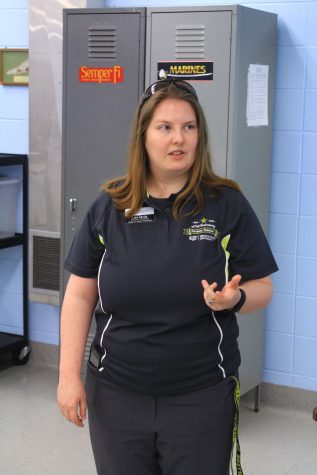The night everything changed
Dec. 4th is always a hard day for former Wichita State students Larry and Julie Breitenstein.
It’s the day their 19-year-old son and student-athlete, Austin, almost lost his life in a car accident near west Wichita in 2009.
Austin was texting and driving when he lost control of his truck, hit a mile-marker and was thrown from his vehicle, landing on his head and shoulder.
Four girls found him and called 911 at 1:56 a.m.
“Texting and driving is an epidemic,” Julie said. “It forever changed our lives.”
It was 3 a.m. when the Breitensteins got the call from state troopers. During the night, Austin endured many surgeries, including a bi-lateral craniotomy, in which surgeons took both bone flaps covering his brain.
The Breitensteins stayed up all night not knowing if their son was going to make it through. They signed donor forms more than once in case their son didn’t make it.
Austin survived, but would never be the same.
“At the age of 19, texting and driving took my son,” Julie said. “He allowed this to happen, and now he lives with a traumatic brain injury.”
Austin spent 26 days in the ICU, costing the family more than half a million dollars.
“To this day, we are still not out of debt, five years later,” Julie said. “Had we not had great insurance, we would have lost everything.”
After he got out of the ICU, he went to rehab—Julie went with him and lived out of a hotel.
Austin’s sister and dad commuted from Wichita for 10 months to see him. Throughout that time, they were cut down to one income and separated into two households. When Julie and her son returned to Wichita, Austin started speech and physical therapy four times a week, which he still does today.
But to this day, Austin still can’t form sentences and constantly struggles with short-term memory loss.
“I needed Austin to understand that he got himself in this situation,” Julie said. “He accepted it early on.”
Austin was going through his therapies, but Julie also went to work to get her son back to what he loved — soccer. He helped at a Friends University soccer game in 2011, running down the soccer balls, and he was able to play in an alumni game that same year.
Julie also knew she wanted to get him back to work. So she called Olive Garden, where he worked in high school.
“They always said Austin had a place with them, and I took them up on it,” she said.
She got her son back on the soccer field, in some capacity, and back to work. She wasn’t going to let him sit around for a second when he was able to physically go out.
“People think they’re invincible,” Julie said. “Austin thought he was untouchable. Once the damage is done, it’s done.”
Julie finds it extremely alarming to see the amount of selfies online and to hear about people snapping and driving.
“It’s inevitable that those people are going to have a rear-end accident or get in trouble in some way,” Julie said.
Despite everything, Julie said she has found a new purpose in life. She has begun to speak at high schools all over the United States.
All of it is government funded, with a purpose to get people to stop texting and driving.
“If I can touch one person every time an article is written, or I give a talk to put down the cell phone, that means the world to me,” Julie said. “My dream is that someday Austin can take over speaking to the high schools. In the meantime, I will be his voice.”









